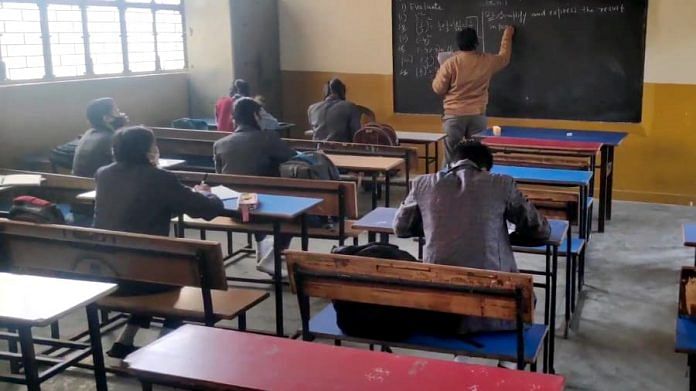New Delhi: The Supreme Court Monday ruled in favour of the autonomy of private unaided schools to fix and collect “just” and “permissible” school fees from parents, asserting that a state government cannot violate this autonomy even during a pandemic.
The top court was hearing a batch of appeals filed by private unaided schools in Rajasthan against government notifications asking them to defer collection of fees. The notifications also called for a reduction in tuition fees by schools affiliated to the Central Board of Secondary Education (CBSE) and those affiliated to the Rajasthan Board of Secondary Education for the 2020-21 academic session, and asked them to charge 70 per cent and 60 per cent of the total tuition fees respectively.
This was done through an order passed on 28 October last year, after the syllabus was reduced by the two boards due to the prolonged nationwide lockdown in 2020.
However, the SC bench comprising Justices A.M. Khanwilkar and Dinesh Maheshwari ruled that neither the Disaster Management Act nor the Rajasthan Epidemic Diseases Act 2020 allows the state government to issue directions to “private parties on economic aspects of legitimate subsisting contractual matters or transactions between them”.
The court asserted that the Act does not have any “express provision … which empowers the Director, Secondary Education (or the State Government) to issue order and directions in respect of school fee structure because of the pandemic situation”.
The 128-page judgment read: “It is one thing to say the State may regulate the fee structure of private unaided schools to ensure that the school management does not indulge in profiteering and commercialisation, but in the guise of exercise of that power, it cannot transcend the line of regulation and impinge upon the autonomy of the school to fix and collect ‘just’ and ‘permissible’ school fees from its students.”
The judgment will impact around 36,000 private unaided schools, including 220 minority private unaided schools, in Rajasthan.
Also read: School fee payment plea reaches SC — a look at how 12 HCs ruled on the issue since April
‘Collect 15% less fee’
The court, however, directed the schools to reduce the fee by 15 per cent in light of the unused facilities by the students last academic session. It said that collection of this 15 per cent amount “would be a case of profiteering and commercialisation by the school Management”.
Aside from this, the court left it open for the schools to give any further concession to their students.
While the school fees are supposed to be paid in six equal monthly instalments before 5 August, the court directed the school management to not debar any student from attending either online classes or physical classes if they fail to pay. Schools were also barred from withholding results of any students for this reason.
The school managements have also been asked to consider any individual request by parents “sympathetically”.
“It is for the school Management to reschedule payment of school fee in such a way that not even a single student is left out or denied the opportunity of pursuing his/her education, so as to effectuate the adage ‘live and let live’,” the court asserted.
Also read: Delhi High Court allows schools to block students, who haven’t paid fees, from online classes
Rajasthan HC had upheld order
The private schools moved SC on the matter after the Rajasthan High Court upheld the state government’s order on 18 December last year.
The HC had ruled that the state government was competent to issue such directions since they were necessary policy decisions passed in the wake of the pandemic.
The schools, however, contended that the Disaster Management Act, the Rajasthan Epidemic Diseases Act and the Rajasthan Schools (Regulation of Fee) Act 2016 do not allow the state government to reduce the quantum of fees to be collected by private schools.
Meanwhile, the state contended that this was done to take care of the parents.
However, the SC bench asserted that “this is akin to rob Peter to pay Paul”.
“It is a different matter, if as a policy, the State Government takes the responsibility to subsidise the school fees of students of private unaided schools, but cannot arrogate power to itself … to issue impugned directions (to school Management to collect reduced school fee for the concerned academic year),” it added.
(Edited by Rachel John)
This report has been updated to accurately reflect that the Supreme Court notification asked schools to charge 60% and 70% of total tuition fees and not reduce the fees by 60-70%.
Also read: This is how CBSE schools will assess Class 10 results in the absence of board exams



